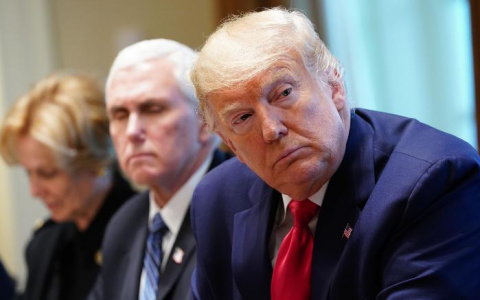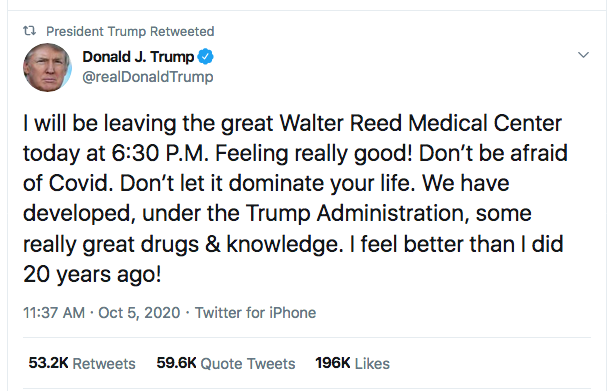
When the boss defies the details, organizational pressure builds until delegation becomes impossible. By the time the diagnosis hits, it’s too late for fresh air.
If you were hunting a new topic of speculation, Donald Trump taking a helicopter ride to the hospital is just what you were looking for.
Yes, he caught COVID. A lot of other people in his orbit apparently now carry the virus as well.
But beyond that, onlookers trained to suspect partisan bias in even the most innocent statement of fact have free range to read between the lines.
The theories are endless. Trump might have courageously opened himself up to a potentially deadly infection to remind voters how to be brave, Fox host Glen Gutfeld pondered on air.

Or he has a miracle cure waiting in the wings. Or he made a cold electoral calculation and decided to roll the dice. Or he’s faking for sympathy. Or the Deep State is trying to kill him.
He’s feeling great and working hard. Or he’s extremely sick and reacting badly to shot after experimental shot. He’ll be back in the White House today or, according to a transparently “anonymous” leak from his own chief of staff, his condition will require a much longer hospital stay.
Sooner or later, reality will separate fantasy from fact. We’ll know.
But until then, all we can really do is watch the cloud around the White House and look for a little insight we can apply in our own careers.
The imperial client
Whether Trump is a genius or a saint, the people around him tend to be just garden-variety Washington figures.
They aren’t playing N-dimensional chess. Ideally their boss will teach them how to think like he does, but in the meantime they need enough information and enough space to do their jobs.
It’s best if the information is accurate or at least delivered in a way that normal Washington thought processes can digest. When it isn’t, people make mistakes.
Nobody seems to be in charge of the president’s health updates. Now even the press secretary has tested positive, so there probably won’t be any more public briefings.
Apparently that extends to White House staff and the Trump campaign as well. Melania’s office told her people to work from home. So did Mike Pence. Clear guidance for the president’s team has been less forthcoming.
Glitches are understandable when the boss who micromanages everything is unexpectedly out of the loop. But in the most important office on the planet and with a situation as serious as COVID, there should be some kind of discipline in place to catch as many mistakes as possible.
Many of us have worked with clients who think they know everything. Maybe they do. But unless they can convince you to abandon your training, your experience and your intuition, they’re going to fight your recommendations every step of the way.
And even in that scenario where you back down to keep the account, the client calls the shots. When the client drops out of the loop, the natural impulse is to delay any meaningful decisions.
After all, you don’t have the authority and while you want to do the right thing, the blame math just doesn’t encourage taking a lot of risks. Let the boss handle it.
I come from a world where fortunes on a Trump scale were handled by sprawling organizations. We had specialists and even the principals deferred to their expertise. And within the office, we trusted each other to generally do the smart thing as well as speak up when something didn’t look right.
Maybe it’s inefficient, but we got a lot done. The principals are doing fine. They’re pursuing their agendas as implacably as anyone can. None of it would happen if they spent a lot of personal time second-guessing the day-to-day details.
I hope you never stick with a client who thinks they know everything. Cut them loose. Work with people who value your expertise and your input.
What does this have to do with the White House? Read it again. If Trump’s people can’t keep him healthy enough to concentrate on his agenda, that’s a loss, especially if as he says “only he” can do it.
And if Trump deliberately opened himself up to the disease out of some nebulous strategy, a lot of his closest allies managed to get infected along the way. Herman Cain is already dead.
Keep information flowing
The stakes are real. People are already voting and from what I’m hearing, people in the campaign are having a hard time figuring out how to protect themselves, their families and their work processes while the calendar ticks toward November.
Credible information helps. Tracing all the COVID contacts and the timeline reveals who needs to worry, who needs tests and who should go home to avoid exposing other people in the organization.
Health requires transparency. Beating a health crisis requires data.
Every doctor knows what it’s like to fight a patient who knows better. As I understand it, the protocol is to do what you can, but beyond a certain point, you have to stop arguing.
Maybe Trump is arguing with his doctors right now. He wants out of the hospital and back on the campaign trail. I get it.
Nobody I’ve talked to can really figure out the details of his treatment that have emerged so far. But then again, we don’t have all the details.
That’s okay. Security clearances and medical confidentiality exist for a reason. However, human beings are naturally curious and we learn very easily to become skeptical when a narrative doesn’t line up with our experience.
Like children, we want to know “why” things happen. For example, you and I know the market often gyrates on its own tidal momentum, but retail investors still covet explanations.
We give them the best explanations we can. The logic should be convincing and reliable, creating a sense of comfort and even trust.
When they know we’ll tell them the truth about the market, they’ll listen to us when we suggest an investment strategy.
Our forecasts won’t always be right, but transparency helps there, too. We can admit we were wrong and show them where we’ve adjusted the models. We can learn in public.
Otherwise, the client will keep thinking independently. They’ll start checking our math, nitpicking the arguments, asking around for second opinions.
Some of those opinions will be reasonable and others will come from way out in the weeds. Ultimately reality will determine what worked and what was just speculation.
That’s what the country is doing with Donald Trump right now. Some of the theories are implausible, but who knows? Getting sick might be deliberate, some kind of symbolic gesture of sublime courage that his staff couldn’t follow.
Time will tell, Lou Dobbs used to tell me, is the lamest way to end a story. It amounts to a shrug. But right now, that’s where we are. The boss is sick. It’s up to his organization to carry on while he’s gone.
I hope they’re up to it. And I bet they hope the boss comes back soon.



